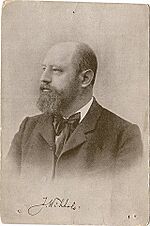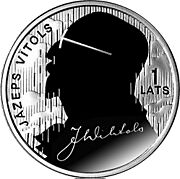Jāzeps Vītols facts for kids
Quick facts for kids
Jāzeps Vītols
|
|
|---|---|
 |
|
| Born | 26 July 1863 |
| Died | 24 April 1948 (aged 84) |
| Resting place | Forest Cemetery, Riga |
| Nationality | Latvian |
| Education | Saint Petersburg Conservatory |
| Known for | Music |
| Spouse(s) | Annija Vītols |
Jāzeps Vītols (born July 26, 1863 – died April 24, 1948) was a famous Latvian composer, teacher, and music critic. He is known as one of the main founders of Latvian classical music.
Biography
Jāzeps Vītols was born in Valmiera, a town in Latvia. His father was a schoolteacher. Jāzeps began studying how to compose music in 1880. He went to the Saint Petersburg Conservatory in Russia. His teacher there was the very famous composer Nikolai Rimsky-Korsakov.
After finishing his studies in 1886, Vītols stayed at the Conservatory. He taught composition to other students. By 1901, he became a Professor. Some of his students later became famous composers themselves, like Nikolai Myaskovsky and Sergei Prokofiev.
Vītols was good friends with other professors, including Alexander Glazunov and Anatoly Lyadov. He often went to special meetings at the home of Mitrofan Belyayev. Belyayev was a music publisher who helped Vītols share his music with the world. Besides teaching, Vītols also wrote about music. He was a music critic for a newspaper called St Petersburger Zeitung from 1897 to 1914.
In 1918, Vītols moved back to Latvia. Latvia had just become an independent country. He started working as a conductor for the Latvian National Opera. The next year, he helped create the first Latvian Conservatory of Music. This school was later renamed the Jāzeps Vītols Latvian Academy of Music to honor him. He taught composition classes there from 1919 to 1944. Some of his most important students during this time were Jānis Ivanovs, Ādolfs Skulte, and Tālivaldis Ķeniņš. He also helped start the Latvian Composers' Society in 1923.
In 1944, during World War II, he moved to Lübeck, Germany. He lived there until he passed away in 1948. In 1993, his remains were brought back to Riga, Latvia.
Vītols was a very busy person. He was a composer, a teacher, and a conductor. He also played the piano and wrote many articles as a music critic. He was also a member of a Latvian university student group called Fraternitas Lataviensis.
His music for choirs is very popular, especially a piece called Gaismas pils (which means The Castle of Light). Latvian choirs often perform this song at the Latvian Song and Dance Festival. Vītols' vocal and choir music is published by a company called Musica Baltica Ltd in Riga.
Musical Style
Jāzeps Vītols was inspired by his Russian friends and teachers. He became the most important person to create "national romanticism" in Latvian music. This means he used music to show the special spirit and stories of Latvia. He is seen as the father of unique Latvian classical music. He was the first Latvian composer to become famous around the world.
His music clearly shows the influence of his teacher, Rimsky-Korsakov. This is especially true in how brilliantly he arranged music for different instruments in an orchestra. Even his friend, composer Alexander Glazunov, noticed this. While he was in Russia, Vītols became very interested in Latvian folk stories and songs. He even led the Latvian Choir in Saint Petersburg. His melodies often use ideas from Latvian folk tunes.
Vītols wanted to create a special musical style for Latvia. He did this by following how the Russian national school of music developed. His bigger musical pieces often have exciting and dramatic parts. Compared to many other composers from the 1900s, his style was a bit more traditional. However, he was a master at composing music.
Works
Jāzeps Vītols wrote many different kinds of music. He composed pieces for orchestras, chamber groups (small groups of instruments), singers, and the piano. One of his most famous works is Gaismas pils (The Castle of Light), which is a popular song for choirs in Latvia. He also wrote many pieces inspired by Latvian folk tunes, like 8 Latvian Folk Tunes for Piano and Fantasy on Latvian Folk Tunes.
Celebration and Remembrance

Jāzeps Vītols spent his summers in Gaujiena, Latvia, with his wife starting in 1922. Soon after, people began celebrating his birthday with music in Gaujiena. Choirs from all over Latvia would come to Gaujiena on July 26 to sing and celebrate Vītols' birthday.
In 2003, a summer camp for children from music schools began. This camp is held around the time of the celebration. Kids at the camp create an orchestra and a choir. They celebrate music, practice their instruments, and have fun together.
Images for kids
 | Ernest Everett Just |
 | Mary Jackson |
 | Emmett Chappelle |
 | Marie Maynard Daly |


